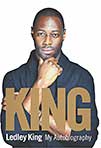 Ledley King: My autobiography
Ledley King: My autobiography
by Ledley King
and Mat Snow
Quercus, £18.99
Reviewed by Alan Fisher
From WSC 328 June 2014
The title of the opening chapter of Ledley King’s autobiography sums it up in two little words: “What If?” He was the perfect contemporary centre-half, with pace, strength, total application and his trademark timing in the tackle as he eased the ball away from onrushing forwards. It was a talent that should have brought him worldwide fame. Instead he spent half his career on the treatment table.
His fortitude in pain and loyalty to the only club he has ever played for has earned him the enduring respect of Spurs fans. An unending saga of breakdown and comeback meant his hopes were rebuilt then crushed as often as his knee, yet King does not show a trace of self-pity; despite agony, disappointment and upheaval at his club, he was grateful for the chance to play.
For virtually half his career King did not train. When his knee was rebuilt, he remodelled his running style. One report suggested that toward the end, his knee was so bad he couldn’t have a garden kickabout with his young son yet come matchday he was often a match for the very best.
Co-author, journalist and Spurs fan Mat Snow utilises a conversational style which gives the book a sense of authenticity, especially in the early passages about King’s upbringing on an east London council estate by a single mother and surrounded by a supportive network of family friends. King has some interesting reflections on the fine margins between success and failure at this level, concluding that attitude and family stability are more significant than ability.
It seems to be out of character to be critical of those around him so expect few revelations. Nonetheless, King sheds some light on the footballing culture differences between Fabio Capello and his squad and confirms years of managerial turmoil at Tottenham, with Glenn Hoddle distant and unable to communicate while first-team coaches Martin Jol and Gus Poyet actively undermined their managers, Jacques Santini and Juande Ramos respectively.
While there’s plenty of interest to Spurs supporters, King played during a largely undistinguished period in the history of club and country so other potential readers may be deterred by a book where the highlight is a League Cup final win and a world tour of physiotherapists. Gradually the dreary routine of daily treatment catches up on body and mind. He plays down the two nightclub altercations that thrust him uncharacteristically into the headlines but there’s no doubt they were linked to the loss of what had mattered most to him since he was a boy – the realisation that he can’t play on and the end of his camaraderie with team-mates. If King has regrets, he hides them well. It’s left to the reader to speculate about those “what ifs?” on his behalf.